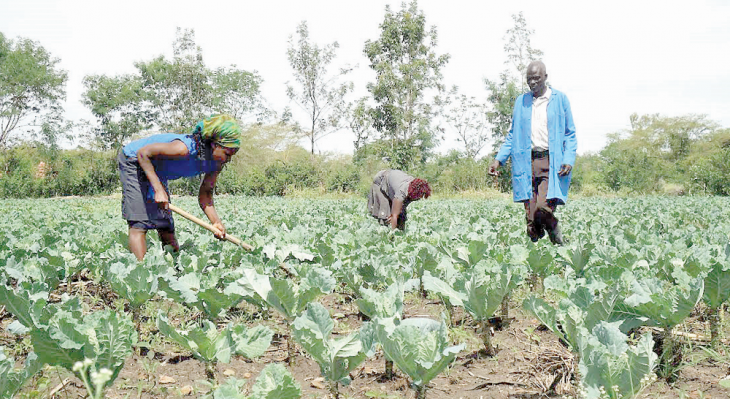Kisumu group scales the heights in horticulture farming

A group of farmers in Kakmie village in Nyando Sub-County, Kisumu County has taken a stab at horticulture farming, an agribusiness, which is giving the area economic impetus.
The farmers who are operating under the name Pamoja Self Help Group have found a niche in growing vegetables as a commercial venture in an area predominantly known for the cultivation of rice as a major crop, as well as seasonal flooding and drought. A vast section of farms in the locality is under irrigated rice farming.
However, the 15-member group, comprising six men and nine women, is making a mark on the potentiality of agri-business within the Kano Plains area through growing horticultural crops.
A decade after it was set up in 2010, the group is leading efforts to champion agricultural productivity locally.
Its members are collectively engaged in the activities at the group level besides replicating it at their respective individual farms with the main objective of promoting food sufficiency in the area.
The farmers majorly grow kales, which are periodically rotated with tomatoes and capsicum on selected farms.
Food security
The group uses generator-powered energy to pump water from community water pans adjacent to the farms. Other farms are located along River Nyando where they source water.
Eric Kere, the caucus chairman, says their activities aim not only to improve members’ livelihoods but also to promote food security in the community.
He says their decision to switch to horticulture was informed by years of neglect of rice farmers by the government as they became poorer than even those who didn’t till their farms because it was expensive to buy farm inputs and they lost everything to rich middlemen.
“Rice failed to cushion us from hunger, but today when you look at what we expect to get from vegetable farming, we can say, if we continue, then hunger will be history for us, and not only here, but feed other parts of the country too,” he says
“We have managed to secure the area in terms of food security. There is no more importation of these farms produce from other places and hence 95 per cent of the households in this area feed from our activities,” he says.
With about Sh10,000 as seed capital, the group bought farm inputs and the balance went into ploughing their one-acre farm.
To start, they planted tomatoes that fetched the group an averagely of Sh120,000. Inspired by the sweet returns, they extended the production to another one acre for tomatoes and another acre of kales in anticipation of raking in increased returns. Eventually, they scaled up production in subsequent seasons.
“From the impressive sales, we became more charged, having realised the great opportunity that needed to be tapped,” explains Kere.
Currently, the group has approximately six acres of farmland under the production of kales at different stages. Some portions are set aside for growing capsicum and tomatoes on a rotational basis.
“We co-opted other members and decided to get more farms to enhance our products and further grow our activities,” he adds.
Initially, the members grew vegetables individually on their farms before taking up the venture at the group level.
Making profits
The farmers harvest three times a month (every 10 days). In every harvest, they get between 20 and 30 50-kilogramme sacks of vegetables. A sack retails at between Sh800 and Sh1,500 in the local market. This varies from time to time depending on the season. They enjoy a lucrative market, especially during dry spells when the supply of vegetables dwindles translating into high demand in the market.
Specifically, Kere says the season is at its peak between April and December when there is a general drought, leading to corresponding high demand for vegetables.
“This is the time when the kale business is sweeter to the farmer. Most farmers depend on rain-fed agriculture and hence they cannot irrigate their farms. But we have the advantage because of the reliable water sources we have around,” he explains.
On a good month, the group earns at least Sh250,000 in profits from selling the vegetables. Its main clients are vegetable traders and households in the Nyando area and its environs.
Part of the income is ploughed back to keep the agribusiness afloat while the remainder is banked and used as a table banking kitty for members.
“Kale is a regular meal for nearly every household so there is a ready market. If well managed, the crop can be actively harvested for six months,” says Kere.
Kale production starts by raising the seedlings in a well-prepared nursery bed.
The seedlings take about three weeks to transplant when they have four true leaves and are about 10 centimetres tall.
The vegetables then mature for harvesting between three and four weeks of growth from transplanting.
The farmer emphasises that maintenance practices, such as regular spraying and weeding are key in keeping the vegetables healthy. This, he says, ensures better yields.
Consequently, the group’s farms are sprayed every week to keep pests at bay.
And with a reliable source of water, the farmers can produce consistently throughout the year. “There is a great potential for commercial agricultural practices in Kano Plains. A long time ago, it was only perceived to be a flood-prone area, but with this initiative, we can show the whole World that such activities can thrive well here,” he says.
He adds: “Members have made great achievements through our farming activities. This is evident in their improved lives and education of their children.”
Violet Kayi, the group treasurer, says the farming activities have turned around members’ fortunes. “The farming activities form our main economic mainstay, the lives of members have been transformed as a result,” she says
Further, she points out that the venture is a source of food security and economic empowerment for the members and the entire community.
She notes that members are finding the business viable because of access to a ready market, adding that similar activities are castigated in the members’ farms.
Caroline Yula, a member of the group concurs, saying the initiative is a source of economic inspiration to the women who initially struggled to support their families.
Yula says group members and the whole community are direct beneficiaries of the venture in terms of food sufficiency and income generation. “Generally, we have experienced notable transformation in the community. Women here have reliable disposable income to support their families comfortably,” she says.







